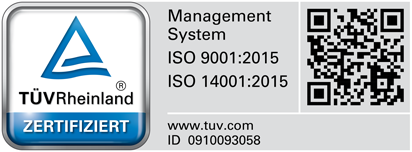sales@lufapak.de +49 2631/384-0 Contactform
MOQ (Minimum Order Quantity)
Minimum order quantities (MOQ) are among the fundamental control elements in modern procurement. They define the smallest quantity that a supplier is willing to sell so that production and distribution are economically viable.
This balance between cost efficiency and flexibility has a significant influence on the success of business relationships. In particular, medium-sized companies are faced with the challenge of optimally adapting their MOQ strategies to market requirements. While large minimum order quantities enable economies of scale and lower unit prices, smaller MOQs offer more leeway for flexible market reactions.
The systematic analysis and design of minimum order quantities is increasingly becoming a strategic success factor. Modern technologies and data-based approaches open up new possibilities for precisely matching supply and demand.
This article highlights the various aspects of MOQs and shows practical solutions for their optimal design.
What is a minimum order quantity?
Minimum Order Quantity, or MOQ for short, refers to the set minimum order quantity for goods or services in business transactions. Suppliers set this minimum quantity to cover their production and logistics costs and ensure profitable business relationships. The basic idea is based on the business necessity of achieving a break-even point. The MOQ enables manufacturing companies in particular to plan their resources efficiently.

Pricing and profitability play a central role in determining the minimum order quantity. Fixed costs are spread across the entire production volume, which means that larger quantities result in lower unit costs. These economies of scale directly influence the profitability of the business. In addition, a well-thought-out MOQ strategy enables the optimisation of inventory levels and transport costs.
The history of minimum order quantities
Minimum order quantities have existed since the beginning of organised trade. Originally, they served mainly to minimise risk for traders and producers. With the industrial revolution, standardised production processes gained in importance, which also changed the requirements for minimum order quantities. Mass production and economies of scale led to new MOQ concepts.
Technological advances enabled more flexible production methods that also made smaller minimum order quantities economically viable. This development continued with digitalisation. Today, automated processes and data-driven analysis allow for more precise determination of MOQs based on real-time market data and customer requirements.
Why companies set minimum order quantities (MOQ)
Cost recovery and profitability
The primary purpose of implementing MOQs is to ensure economic sustainability. Production facilities require minimum utilisation rates to operate cost-effectively. Material orders, personnel planning and logistics processes are aligned with these minimum quantities. By setting appropriate minimum order quantities, companies can optimally distribute their fixed costs.
Profitability calculations are based on various factors such as material costs, labour time and overhead costs. MOQs help to systematically cover these costs while offering competitive prices. A careful MOQ calculation also takes into account seasonal fluctuations and market changes.
Production efficiency
Production lines work most efficiently when operating at optimal capacity. MOQs support this objective by enabling predictable production cycles. Changeover times, material flow and quality assurance can be better coordinated. At the same time, standardised minimum order quantities reduce the administrative effort involved in order processing.
Modern manufacturing systems enable flexible adjustments to production volumes. Nevertheless, MOQs remain an important tool for process optimisation. They ensure continuous production processes and minimise costly interruptions or changeovers.
An overview of different MOQ models
Minimum order quantities are designed according to different models that adapt to specific business requirements. There are numerous gradations between rigid and flexible systems. Factors such as production capacities, storage costs and customer structure are crucial to choosing the appropriate MOQ model. Well-thought-out MOQ strategies are particularly beneficial for medium-sized companies.
Fixed minimum order quantities
Fixed MOQ systems are characterised by clearly defined minimum order quantities. This form offers planning security for suppliers and customers. The fixed quantity is usually based on production cycles or packaging units. Transport costs and storage capacities are also included in the calculation. This model has proven itself through its transparency and ease of use, especially for standardised products.
Flexible MOQ systems
Flexible minimum order quantities react dynamically to market situations and customer needs. Tiered prices or seasonal adjustments enable variable order sizes. Modern merchandise management systems support this flexibility through automated calculations. This allows order quantities to be optimally adapted to current demand situations. This agility creates competitive advantages and strengthens customer relationships.
Impact of MOQ on the supply chain
Minimum order quantities affect all aspects of the supply chain. Material flow, warehousing and transport logistics are based on these requirements. Efficient MOQ strategies optimise the entire value chain. With precise planning, inventory levels and transport costs can be reduced. At the same time, reliable planning improves adherence to delivery dates.
High MOQs – advantages and disadvantages
High minimum order quantities enable economies of scale in production and logistics. The reduction in unit costs makes prices more attractive for bulk buyers. However, the risk of overstocking in the event of fluctuations in demand increases. Capital commitment and storage costs require careful consideration. Small companies in particular often reach their financial limits when faced with high MOQs.
Low MOQs – opportunities and risks
Low minimum order quantities appeal to a broader range of customers. They enable a more flexible response to market changes and reduce inventory risk. The downside is higher unit costs due to more frequent production changes. Transport costs are more significant for small order quantities. Nevertheless, low MOQs offer opportunities for market entry and customer retention.
MOQ optimisation for different industries
Retail
The retail industry requires particularly well-balanced MOQ strategies. Seasonal fluctuations and limited storage space require flexible solutions. The balance between product availability and capital commitment characterises MOQ design. Successful retailers use differentiated minimum order quantities for different product categories. Factors such as shelf life and turnover rate play a central role here.
Production
Manufacturing companies base their MOQs on technical and economic parameters. Set-up times, material availability and machine utilisation determine the minimum batch sizes. Modern manufacturing systems enable increasingly smaller batches while maintaining efficiency. Coordinating MOQs with suppliers and customers requires strategic skill.
Negotiating minimum order quantities
Successful MOQ negotiations require in-depth market knowledge and an understanding of the needs of both sides. Analysing production costs and sales potential forms the basis for reaching realistic agreements. Suppliers and customers must be aware of their economic limits. Professional negotiation skills take into account not only minimum quantities but also delivery intervals and payment terms.
Standardised negotiation processes increase efficiency when setting MOQs. Documenting agreements creates transparency for all parties involved. Regular reviews allow for adjustments to changing market conditions. Long-term partnerships benefit from flexible MOQ rules that offer both sides planning security.
Digitalisation and MOQ management
Digital tools are revolutionising the management of minimum order quantities. Automated systems analyse order histories and forecast demand. Algorithms optimise MOQs based on current market data. Real-time analyses enable quick adjustments to changing conditions. Integration into existing ERP systems simplifies practical implementation.
Data-driven decisions improve the accuracy of MOQ determination. Artificial intelligence supports the identification of optimal order quantities. Cloud-based solutions enable cross-location coordination. Digitalisation creates new possibilities for dynamic MOQ models.
Conclusion: The strategic importance of MOQs
Minimum order quantities remain a central element of successful business relationships. The right MOQ strategy optimises costs and increases competitiveness. Flexible models enable adaptation to different market situations. The trend is towards individualised solutions with simultaneous standardisation of processes.
Practical recommendations for action
Successful MOQ implementation requires a systematic approach. Regular analysis of order data provides important optimisation potential. Coordination with all departments involved ensures practical solutions. Digital tools support implementation and control. It is particularly important to continuously adapt the MOQ strategy to changing market conditions.
The integration of sustainability aspects into MOQ planning is becoming increasingly important. Optimised transport routes and reduced inventories conserve resources. Modern MOQ concepts take ecological factors into account without neglecting economic goals. This holistic approach ensures long-term business success.
Contact us now and get advice

